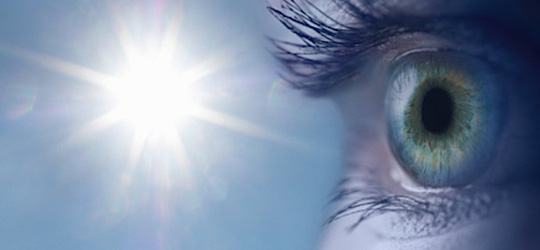Sunlight is the source of life on our planet, however, it can also bring a lot of damage. The danger that sunlight poses appears in the form of ultraviolet (UV) radiation. Though, UV radiation is a part of solar radiation, but it can also come from artificial sources, like welding machines or tanning beds. What is the effect of UV radiation on our eyes?
Studies have shown that short and long term exposure to direct sunlight (or artificial UV radiation sources) can increase chances of developing various eye diseases. Cataract (clouding of the lens), photokeratitis (sunburn to the cornea), pterygium (tissue growth on the whites of the eyes), macular degeneration, and skin cancer of the eyelids are just few of them. Though, it usually takes years for cataract, age-related macular degeneration, and eye cancers to develop, but the time we spend out in the sun without eye protection increases the risks. Indirect sunlight can be also highly harmfull – exposure to light reflected from snow can also quickly cause snow blindness.
Those who spend a lot of time under the midday sun or in the UV-intense conditions found near water bodies (suchs as lake or sea) and mountains belong to the risk groups. Another risk group to develop the diseases mentioned above are children and teenagers – they typically spend more time outside than adults. Since it is not clear how much exposure to solar radiation contributes to eye damage, it is recommended to wear quality sunglasses that offer UV protection whenever you spend time outdoors.

Here are a few tips from the doctors of Lirema Eye Clinic how to protect your eyes from the sun:
– Never look directly at the sun.
– Direct sunlight can damage your eyes all year round. The danger of harm is not reserved only for summertime. So make sure to wear UV-blocking sunglasses and hats whenever you are on a seaside, in mountains or enjoying winter on a bright sunny day.
– Clouds cannot protect you from UV radiation. Harmful rays can cut through haze and thin clouds.
– Not all prescription eyeglasses (that patients wear in case of vision impairment) can shield your eyes from harm UV radiation brings. True, some specialized lenses made of transparent plastic provide protection against harmful UV radiation. Otherwise, you need to wear additional tainted lenses on top of your glasses.
– Note, that not all sunglasses block 100 percent of UV radiation. To be sure if your sunglasses provide proper UV protection, bring them to your ophthalmologist or optician for an evaluation. Eye care professionals usually have spectrophotometers that can measure the amount of visible light and UV radiation your lenses block.
– Be sure to see your ophthalmologist at least every two years for a proper eye examination.
